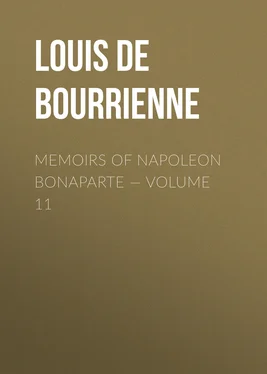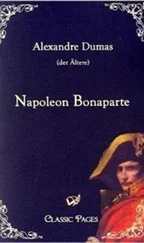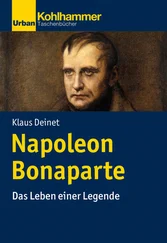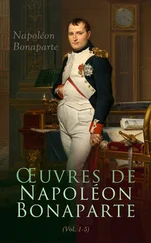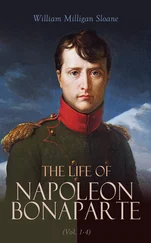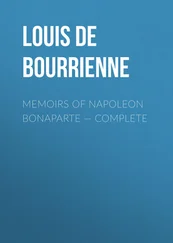Louis Bourrienne - Memoirs of Napoleon Bonaparte — Volume 11
Здесь есть возможность читать онлайн «Louis Bourrienne - Memoirs of Napoleon Bonaparte — Volume 11» — ознакомительный отрывок электронной книги совершенно бесплатно, а после прочтения отрывка купить полную версию. В некоторых случаях можно слушать аудио, скачать через торрент в формате fb2 и присутствует краткое содержание. Жанр: Биографии и Мемуары, История, foreign_edu, foreign_antique, foreign_prose, на английском языке. Описание произведения, (предисловие) а так же отзывы посетителей доступны на портале библиотеки ЛибКат.
- Название:Memoirs of Napoleon Bonaparte — Volume 11
- Автор:
- Жанр:
- Год:неизвестен
- ISBN:нет данных
- Рейтинг книги:5 / 5. Голосов: 1
-
Избранное:Добавить в избранное
- Отзывы:
-
Ваша оценка:
- 100
- 1
- 2
- 3
- 4
- 5
Memoirs of Napoleon Bonaparte — Volume 11: краткое содержание, описание и аннотация
Предлагаем к чтению аннотацию, описание, краткое содержание или предисловие (зависит от того, что написал сам автор книги «Memoirs of Napoleon Bonaparte — Volume 11»). Если вы не нашли необходимую информацию о книге — напишите в комментариях, мы постараемся отыскать её.
Memoirs of Napoleon Bonaparte — Volume 11 — читать онлайн ознакомительный отрывок
Ниже представлен текст книги, разбитый по страницам. Система сохранения места последней прочитанной страницы, позволяет с удобством читать онлайн бесплатно книгу «Memoirs of Napoleon Bonaparte — Volume 11», без необходимости каждый раз заново искать на чём Вы остановились. Поставьте закладку, и сможете в любой момент перейти на страницу, на которой закончили чтение.
Интервал:
Закладка:
"I wrote conformably with the Emperor's orders, but no confession was obtained from Staps. In his examination by General Lauer he repeated nearly what he had said in the presence of Napoleon. His resignation and firmness never forsook him for a moment; and he persisted in saying that he was the sole author of the attempt, and that no one else was aware of it. Staps' enterprise made a deep impression on the Emperor. On the day when we left Schoenbrunn we happened to be alone, and he said to me, 'I cannot get this unfortunate Staps out of my mind. The more I think on the subject the more I am perplexed. I never can believe that a young man of his age, a German, one who has received a good education, a Protestant too, could have conceived and attempted such a crime. The Italians are said to be a nation of assassins, but no Italian ever attempted my life. This affair is beyond my comprehension. Inquire how Staps died, and let me know.'
"I obtained from General Lauer the information which the Emperor desired. I learned that Staps, whose attempt on the Emperor's life was made on the 23d of October; was executed at seven o'clock in the morning of the 27th, having refused to take any sustenance since the 24th. When any food was brought to him he rejected it, saying, 'I shall be strong enough to walk to the scaffold.' When he was told that peace was concluded he evinced extreme sorrow, and was seized with trembling. On reaching the place of execution he exclaimed loudly, 'Liberty for ever! Germany for ever! Death to the tyrant!'"
Such are the notes which I committed to paper after conversing with Rapp, as we were walking together in the garden of the former hotel of Montmorin, in which Rapp resided. I recollect his showing me the knife taken from Staps, which the Emperor had given him; it was merely a common carving-knife, such as is used in kitchens. To these details may be added a very remarkable circumstance, which I received from another but not less authentic source. I have been assured that the attempt of the German Mutius Scaevola had a marked influence on the concessions which the Emperor made, because he feared that Staps, like him who attempted the life of Porsenna, might have imitators among the illuminati of Germany.
It is well known that after the battle of Wagram conferences were open at Raab. Although peace was almost absolutely necessary for both powers, and the two Emperors appeared to desire it equally, it was not, however, concluded. It is worthy of remark that the delay was occasioned by Bonaparte. Negotiations were therefore suspended, and M. de Champagny had ceased for several days to see the Prince of Lichtenstein when the affair of Staps took place. Immediately after Napoleon's examination of the young fanatic he sent for M. de Champagny: "How are the negotiations going on?" he inquired. The Minister having informed him, the Emperor added, "I wish them to be resumed immediately: I wish for peace; do not hesitate about a few millions more or less in the indemnity demanded from Austria. Yield on that point. I wish to come to a conclusion: I refer it all to you." The Minister lost no time in writing to the Prince of Lichtenstein: on the same night the two negotiators met at Raab, and the clauses of the treaty which had been suspended were discussed, agreed upon, and signed that very night. Next morning M. de Champagny attended the Emperor's levee with the treaty of peace as it had been agreed on. Napoleon, after hastily examining it, expressed his approbation of every particular, and highly complimented his Minister on the speed with which the treaty had been brought to a conclusion.
—[This definitive treaty of peace, which is sometimes called the Treaty of Vienna, Raab, or Schoenbrunn, contained the following articles:
1. Austria ceded in favour of the Confederation of the Rhine (these fell to Bavaria), Salzburg, Berchtolsgaden, and a part of Upper Austria.
2. To France directly Austria ceded her only seaport, Trieste, and all the countries of Carniola, Friuli, the circle of Vilach, with parts of Croatia end Dalmatia. (By these cessions Austria was excluded from the Adriatic Sea, and cut off from all communication with the navy of Great Britain.) A small lordship, en enclave in the, territories of the Grieve League, was also gives up.
3. To the constant ally of Napoleon, to the King of Saxony, in that character Austria ceded some Bohemian enclaves in Saxony end, in his capacity of Grand Duke of Warsaw, she added to his Polish dominions the ancient city of Cracow, and all Western Galicia.
4. Russia, who had entered with but a lukewarm zeal into the war as an ally of France, had a very moderate share of the spoils of Austria. A portion of Eastern Galicia, with a population of 400,000 souls, was allotted to her, but in this allotment the trading town of Brody (almost the only thing worth having) was specially excepted. This last circumstance gave no small degree of disgust to the Emperor Alexander, whose admiration of Napoleon was not destined to have a long duration.—Editor of 1836 edition.]—
CHAPTER XXI
1809.
The Princess Royal of Denmark—Destruction of the German Empire— Napoleons visit to the Courts of Bavaria and Wurtemberg—His return to France—First mention of the divorce—Intelligence of Napoleon's marriage with Maria Louisa—Napoleon's quarrel with Louis—Journey of the Emperor and Empress into Holland—Refusal of the Hanse Towns to pay the French troops—Decree for burning English merchandise— M. de Vergennes—Plan for turning an inevitable evil to the best account—Fall on the exchange of St Petersburg
About this time I had the pleasure of again seeing the son of the reigning Duke of Mecklenburg-Schwerin, whose arrival in the Hanse Towns was speedily followed by that of his sister, Princess Frederica Charlotte of Mecklenburg, married to the Prince Royal of Denmark, Christian Frederick. In November the Princess arrived at Altana from Copenhagen, the reports circulated respecting her having compelled her husband to separate from her. The history of this Princess, who, though perhaps blamable, was nevertheless much pitied, was the general subject of conversation in the north of Germany at the time I was at Hamburg. The King of Denmark, grieved at the publicity of the separation, wrote a letter on the subject to the Duke of Mecklenburg. In this letter, which I had an opportunity of seeing, the King expressed his regret at not having been able to prevent the scandal; for, on his return from a journey to Kiel, the affair had become so notorious that all attempts at reconciliation were vain. In the meantime it was settled that the Princess was to remain at Altona until something should be decided respecting her future condition.
It was Baron Plessen, the Duke of Mecklenburg's Minister of State, who favoured me with a sight of the King of Denmark's letters. M. Plessen told me, likewise, at the time that the Duke had formed the irrevocable determination of not receiving his daughter. A few days after her arrival the Princess visited Madame de Bourrienne. She invited us to her parties, which were very brilliant, and several times did us the honour of being present at ours. But; unfortunately, the extravagance of her conduct, which was very unsuitable to her situation, soon became the subject of general animadversion.
I mentioned at the close of the last chapter how the promptitude of M. de Champagny brought about the conclusion of the treaty known by the name of the Treaty of Schoenbrunn. Under this the ancient edifice of the German Empire was overthrown, and Francis II. of Germany became Francis I., Emperor of Austria. He, however, could not say, like his namesake of France, 'Tout est perdu fors l'honneur'; for honour was somewhat committed, even had nothing else been lost. But the sacrifices Austria was compelled, to make were great. The territories ceded to France were immediately united into a new general government, under the collective denomination of the Illyrian Provinces. Napoleon thus became master of both sides of the Adriatic, by virtue of his twofold title of Emperor of France and King of Italy. Austria, whose external commerce thus received a check, had no longer any direct communication with the sea. The loss of Fiume, Trieste, and the sea-coast appeared so vast a sacrifice that it was impossible to look forward to the duration of a peace so dearly purchased.
Читать дальшеИнтервал:
Закладка:
Похожие книги на «Memoirs of Napoleon Bonaparte — Volume 11»
Представляем Вашему вниманию похожие книги на «Memoirs of Napoleon Bonaparte — Volume 11» списком для выбора. Мы отобрали схожую по названию и смыслу литературу в надежде предоставить читателям больше вариантов отыскать новые, интересные, ещё непрочитанные произведения.
Обсуждение, отзывы о книге «Memoirs of Napoleon Bonaparte — Volume 11» и просто собственные мнения читателей. Оставьте ваши комментарии, напишите, что Вы думаете о произведении, его смысле или главных героях. Укажите что конкретно понравилось, а что нет, и почему Вы так считаете.
